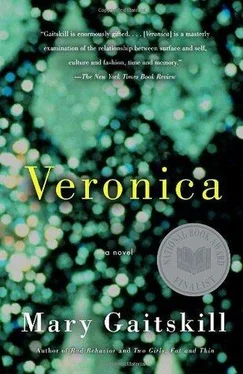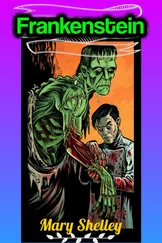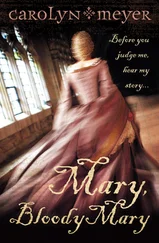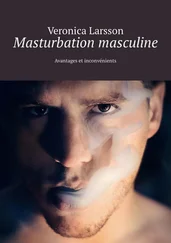“Flowers on the side! I’d love that!”
“You could wear galoshes and make jam.”
“I could! It’s not too late — I’m in great shape! Who knows, I may not get sick. I could double-shift a few years and make enough to pay for a cottage near the ocean.”
The red jam in its porcelain pot was like a viscous jewel in the sun. I imagined Veronica in her cottage, among flowers and fallen petals.
“But you know, Alison — you shouldn’t listen to the things I say about my parents. You know me, I’ll say anything for a cheap laugh. They weren’t so bad.”
“No?”
“No. My mother had a beautiful voice and she sang to us almost every night. She put on plays with us when we were little, wrote songs for us to sing. When we went to bed at night, she would say, ‘Here are all the people who love you.’ And she’d name everybody, every cousin, every great-aunt. She built a fence of protection with those names. And my father would come and stand at the door and watch over us all.” She smoked and exhaled, making a tiny redness on the wet butt. “I can still see him standing there.” She smiled and put out her cigarette.
There were small flowers sprouting on bushes growing alongside the path. They were a flat tough red that paled as their petals extended out, changing into a color that was oddly fleshy, like the underside of a tongue. They grew on clay red branches, slick and shiny in the rain, and they had tough red-tinged leaves. Against the gray sky, they were startling, almost rude. Not the right flower, I thought. Veronica had been startled enough. She needed silkiness and softness.

Patrick came back to me at a party. It was a benefit given for an AIDS relief organization. Lots of rich fucks milling, and me standing there. Before I saw him, I saw a black supermodel named Nadia, a woman known for her arrogance and meanness. “Oh no,” muttered a magazine editor, “here comes Miss Big Bitch.” But, like everyone else, he watched her move through the room. She moved like a queen inside a twittering entourage that functioned like a parade float of feathers and papier-mâché. She started conversations, then turned her back on them. She threatened relationships with a look. She made everyone either an extension of her or invisible. Her movements expressed a blistering scorn, which perversely electrified her beauty and made it even greater than it might otherwise have been.
I looked at her and saw her avenging the German woman who walked alone on the street with her arms wrapped around her torso, staring with hollowed eyes. I heard her say, Is this what you people really want? Is this what so awes and impresses you? This? All right, then, I’ll give it to you.
“You better be careful,” I said to the editor. “Secretly, I’m a big bitch, too.”
That’s when I saw Patrick. Warm with borrowed anger, sex, and pride, I crossed the room, borrowed raiment flowing. It sometimes takes a while for people to notice that borrowed things don’t quite fit, and so for the moment they do. He smiled, his expression sweet and broad, and flicked his head, casting off nervous feeling as if it were sweat. We bantered and joked, circling, gliding around each other like animals getting ready to play. We kissed against the wall, and in a closet, and finally in the bathroom, like people on soft-core TV, me on the sink with my haunches up.
When we came out, Nadia had moved on and the air of the room had changed, like the sea in the wake of a great wave. All the little creatures and shells still stirred, fitful and chaotic. An oyster sweating in his cream-colored shell was talking into a microphone about something nobody could hear. A laughing blond bit of seaweed rolled against a scudding black-haired pebble and they slid down the wall, laughing. Patrick said, “Honey, let’s go,” and we swam for the door.
On the street, everything was rushing and corporeal, and the sky was soft blue, with small salmon-colored clouds. We went into a deli and wandered giddily among the rows of cans and bottles, wrapped pastel sponges, and a flashing orange cat. Tiny pictures that had smiled at us as children smiled at us as adults: a tuna wearing sunglasses, a laughing green man wearing leaves. We got potato chips and juices and went back out under the soft, glowing sky. A taxi shuddered to a halt and took us into its creaking dimness with a slam. A song came out of the radio, bouncing like balls of colored candy on a conveyor belt. “One more shot!” Bounce bounce! “Cos I love you!” The city rolled along, breaking against our driver’s stalwart hairy neck.
“I have something for you,” said Patrick. Smiling, he held out his bunched fist.
“Hmm?”
He smiled and opened his hand. I saw my wadded underpants. I blinked. The world opened its mouth and laughed like it was a baby being tickled. I’d forgotten to put them on when we were leaving the bathroom; he’d seen them come out my pant leg and fall on the deli floor. The cat flashed past; the green man laughed. We laughed, rolling around in the taxi, kissing. The city rolled along beyond the clouded bulletproof plastic that protected the driver with its hinged pocket for the wadded fare. It was stickered with advertisements for clubs and bands, and the stickers were doodled on with ballpoints and the radio drew its doodles on everything. Oh Miss Big Bitch, even you are overlaid with doodles and radio songs.
“I love you,” I said.
He held me close and kissed me and his body said, Yes, and here we go.
He was still with the black-haired actress and her articulate shoulder. That was all right. If the entire world was going to open its mouth and laugh, there was certainly room for her. She could be in the world and I could be in the laughter that came rolling out and bounced away. There was room.
Once, I arranged for Patrick to come to my apartment right after a visit with Veronica; he arrived a few minutes early and so the two met.
“That’s the woman who has AIDS?” he asked incredulously. “That’s outrageous!”
“Why do you say that?”
“Because she looks like somebody’s maiden aunt! How on earth did this happen to her?”
“She is somebody’s maiden aunt, you idiot. Not technically a maiden maybe, but … it doesn’t matter anyway.”
“I know it doesn’t matter. I’m not an idiot. But you know what I mean. She doesn’t look like somebody who’d get AIDS from sleeping with a bisexual guy.” He took my hand. “Alison, you’re so sweet and human and you don’t even know. You weren’t friends with this person before she got sick, were you?”
“She’s not sick now. We were friends. We were good work buddies.”
“But you know, most people, when something like that happens, unless it’s a really tight relationship, they run. That’s when you became her friend.”
“So what? I don’t think I should get a medal for acting decent,” I said.
Later that night, Patrick said, “That woman’s face was so bizarre. Veronica, I mean. She was just vibrating with bizarreness.”
I have not spoken to or seen Patrick for over twenty years. Still, on the mountain, I answered him. “Yes,” I said. “She was bizarre. She was in pain and she was all alone. That can make a person bizarre.”
But the thing was, I hadn’t always acted decent.
Veronica was alone because her friends left her. She said they left her because she was sick, but I don’t know what they would’ve said. She said, “They all told me, ‘Don’t sleep with him!’ But I did, and now they’re all angry with me. They want to think they’re right, because if they can think they’re right, they can think they won’t get sick.” She shrugged. “I can understand that. It’s idiotic. But I can understand.”
Читать дальше













